Legislation, Ethics, and CSR in Travel and Tourism
VerifiedAdded on 2020/01/07
|13
|4119
|68
Report
AI Summary
This report delves into the legal and ethical aspects of the travel and tourism sector. It begins with an overview of the legal and regulatory frameworks, including acts related to tourism development, transport, and package holidays. The report then explores surface, sea, and air transport laws, emphasizing passenger safety and luggage protection. The impact of health, safety, and security legislation, such as workplace regulations and reporting requirements, is examined, alongside legislation promoting equality within the industry. Furthermore, the report analyzes contract and consumer protection legislation, outlining essential elements of travel contracts and the rights of consumers. Ethical dilemmas and corporate social responsibility (CSR) within the travel and tourism sector are also discussed, highlighting the importance of ethical conduct and sustainable practices. The report provides a comprehensive understanding of the legal, ethical, and social responsibilities of travel and tourism businesses, offering valuable insights for industry professionals and students.
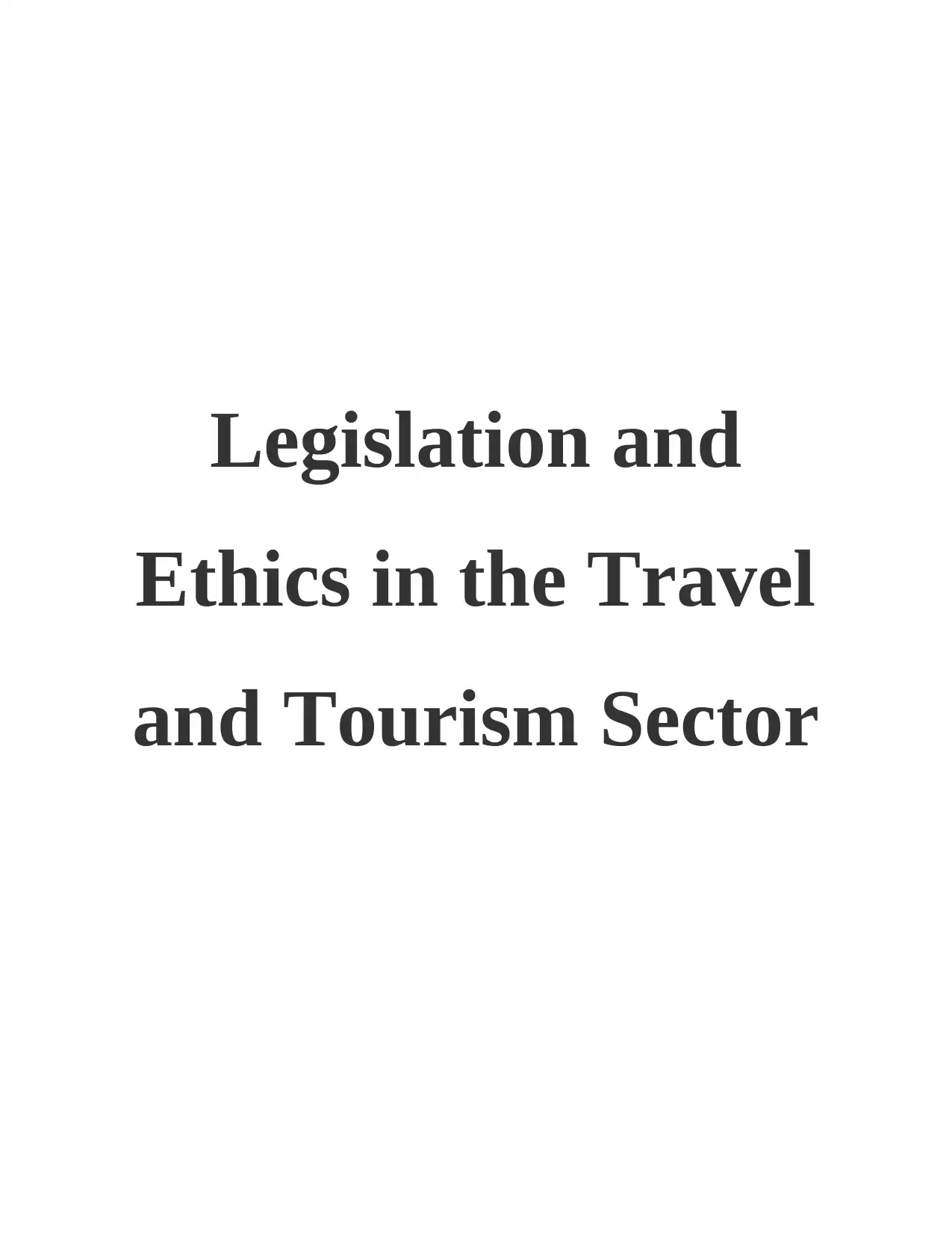
Legislation and
Ethics in the Travel
and Tourism Sector
Ethics in the Travel
and Tourism Sector
Paraphrase This Document
Need a fresh take? Get an instant paraphrase of this document with our AI Paraphraser
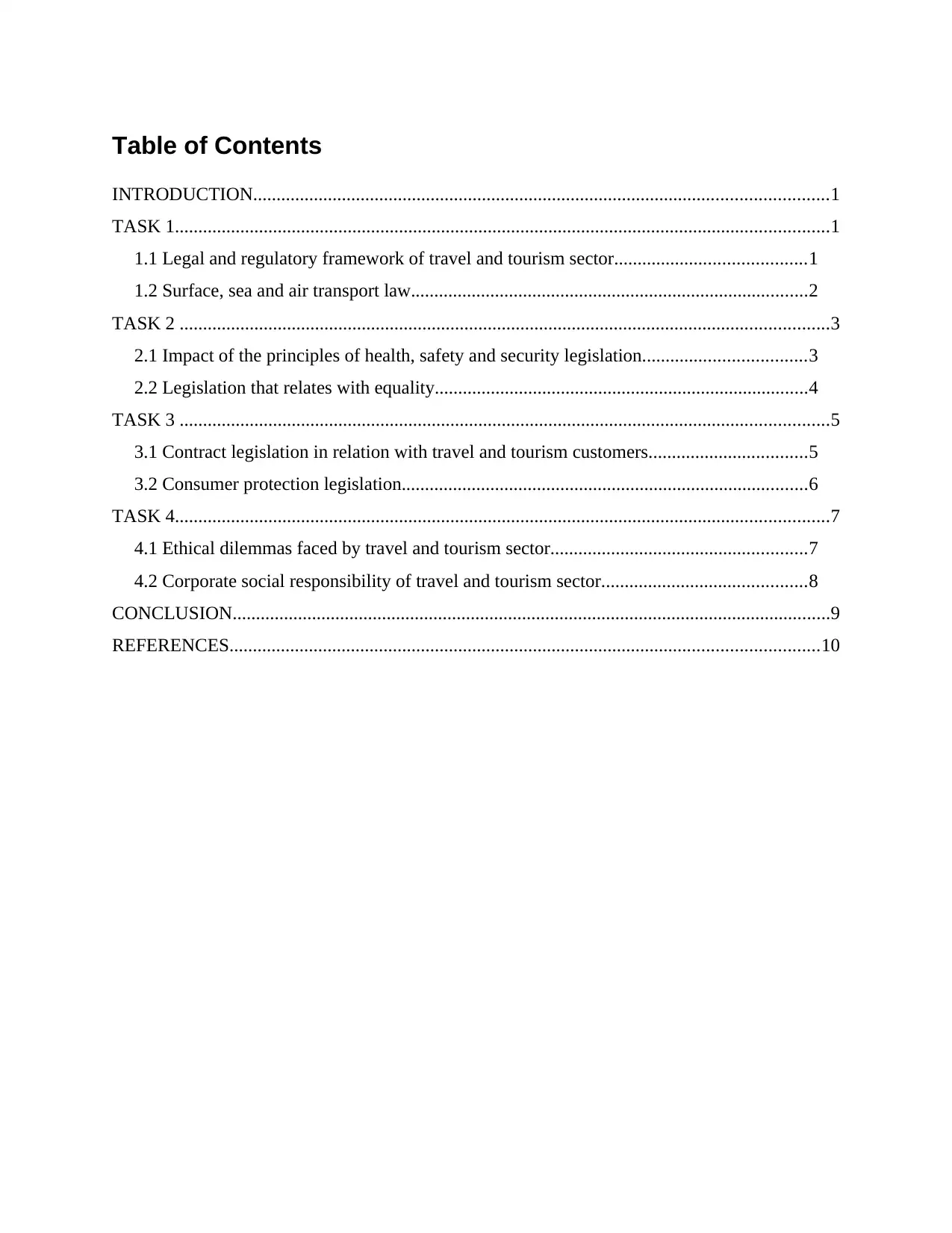
Table of Contents
INTRODUCTION...........................................................................................................................1
TASK 1............................................................................................................................................1
1.1 Legal and regulatory framework of travel and tourism sector.........................................1
1.2 Surface, sea and air transport law.....................................................................................2
TASK 2 ...........................................................................................................................................3
2.1 Impact of the principles of health, safety and security legislation...................................3
2.2 Legislation that relates with equality................................................................................4
TASK 3 ...........................................................................................................................................5
3.1 Contract legislation in relation with travel and tourism customers..................................5
3.2 Consumer protection legislation.......................................................................................6
TASK 4............................................................................................................................................7
4.1 Ethical dilemmas faced by travel and tourism sector.......................................................7
4.2 Corporate social responsibility of travel and tourism sector............................................8
CONCLUSION................................................................................................................................9
REFERENCES..............................................................................................................................10
INTRODUCTION...........................................................................................................................1
TASK 1............................................................................................................................................1
1.1 Legal and regulatory framework of travel and tourism sector.........................................1
1.2 Surface, sea and air transport law.....................................................................................2
TASK 2 ...........................................................................................................................................3
2.1 Impact of the principles of health, safety and security legislation...................................3
2.2 Legislation that relates with equality................................................................................4
TASK 3 ...........................................................................................................................................5
3.1 Contract legislation in relation with travel and tourism customers..................................5
3.2 Consumer protection legislation.......................................................................................6
TASK 4............................................................................................................................................7
4.1 Ethical dilemmas faced by travel and tourism sector.......................................................7
4.2 Corporate social responsibility of travel and tourism sector............................................8
CONCLUSION................................................................................................................................9
REFERENCES..............................................................................................................................10
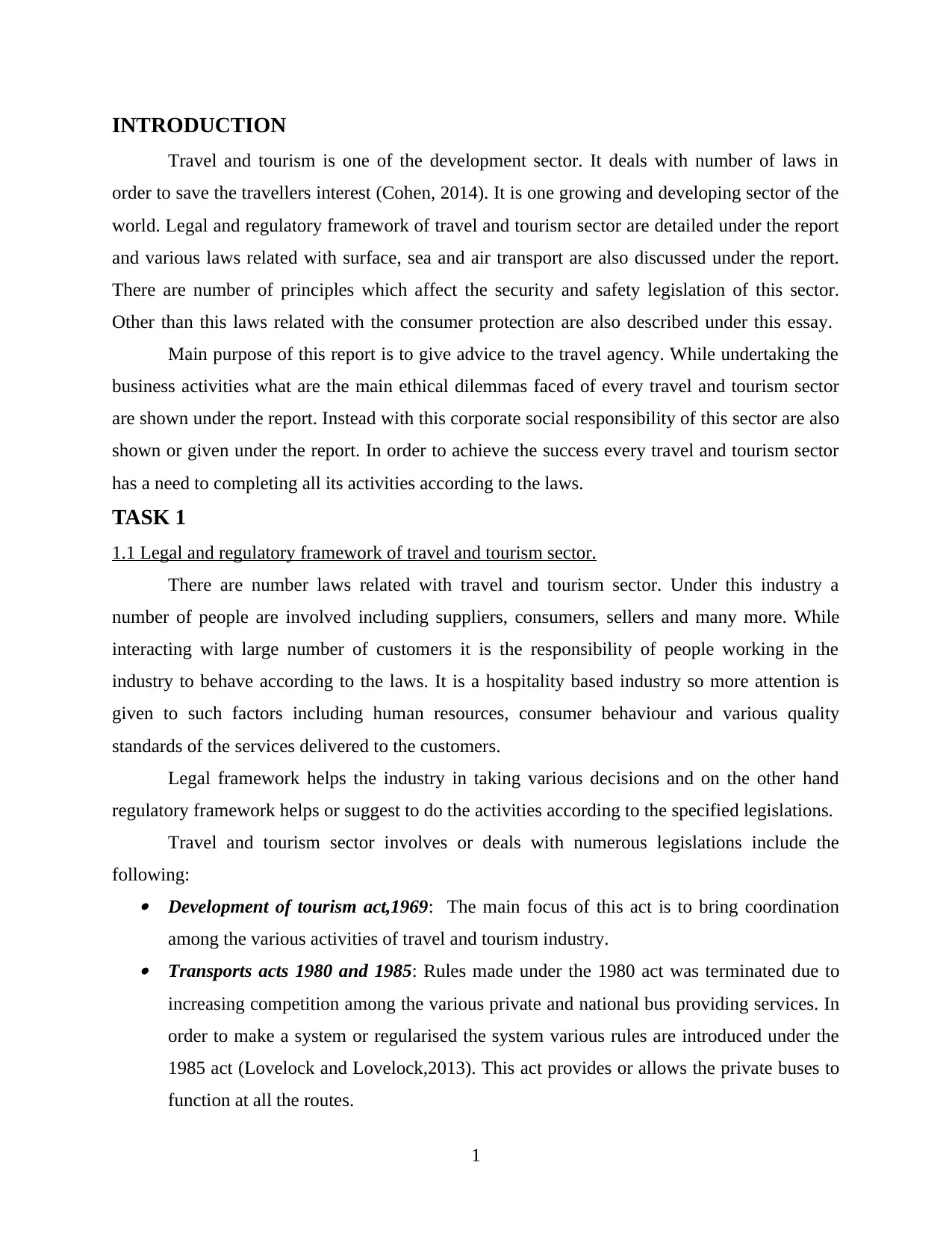
INTRODUCTION
Travel and tourism is one of the development sector. It deals with number of laws in
order to save the travellers interest (Cohen, 2014). It is one growing and developing sector of the
world. Legal and regulatory framework of travel and tourism sector are detailed under the report
and various laws related with surface, sea and air transport are also discussed under the report.
There are number of principles which affect the security and safety legislation of this sector.
Other than this laws related with the consumer protection are also described under this essay.
Main purpose of this report is to give advice to the travel agency. While undertaking the
business activities what are the main ethical dilemmas faced of every travel and tourism sector
are shown under the report. Instead with this corporate social responsibility of this sector are also
shown or given under the report. In order to achieve the success every travel and tourism sector
has a need to completing all its activities according to the laws.
TASK 1
1.1 Legal and regulatory framework of travel and tourism sector.
There are number laws related with travel and tourism sector. Under this industry a
number of people are involved including suppliers, consumers, sellers and many more. While
interacting with large number of customers it is the responsibility of people working in the
industry to behave according to the laws. It is a hospitality based industry so more attention is
given to such factors including human resources, consumer behaviour and various quality
standards of the services delivered to the customers.
Legal framework helps the industry in taking various decisions and on the other hand
regulatory framework helps or suggest to do the activities according to the specified legislations.
Travel and tourism sector involves or deals with numerous legislations include the
following: Development of tourism act,1969: The main focus of this act is to bring coordination
among the various activities of travel and tourism industry. Transports acts 1980 and 1985: Rules made under the 1980 act was terminated due to
increasing competition among the various private and national bus providing services. In
order to make a system or regularised the system various rules are introduced under the
1985 act (Lovelock and Lovelock,2013). This act provides or allows the private buses to
function at all the routes.
1
Travel and tourism is one of the development sector. It deals with number of laws in
order to save the travellers interest (Cohen, 2014). It is one growing and developing sector of the
world. Legal and regulatory framework of travel and tourism sector are detailed under the report
and various laws related with surface, sea and air transport are also discussed under the report.
There are number of principles which affect the security and safety legislation of this sector.
Other than this laws related with the consumer protection are also described under this essay.
Main purpose of this report is to give advice to the travel agency. While undertaking the
business activities what are the main ethical dilemmas faced of every travel and tourism sector
are shown under the report. Instead with this corporate social responsibility of this sector are also
shown or given under the report. In order to achieve the success every travel and tourism sector
has a need to completing all its activities according to the laws.
TASK 1
1.1 Legal and regulatory framework of travel and tourism sector.
There are number laws related with travel and tourism sector. Under this industry a
number of people are involved including suppliers, consumers, sellers and many more. While
interacting with large number of customers it is the responsibility of people working in the
industry to behave according to the laws. It is a hospitality based industry so more attention is
given to such factors including human resources, consumer behaviour and various quality
standards of the services delivered to the customers.
Legal framework helps the industry in taking various decisions and on the other hand
regulatory framework helps or suggest to do the activities according to the specified legislations.
Travel and tourism sector involves or deals with numerous legislations include the
following: Development of tourism act,1969: The main focus of this act is to bring coordination
among the various activities of travel and tourism industry. Transports acts 1980 and 1985: Rules made under the 1980 act was terminated due to
increasing competition among the various private and national bus providing services. In
order to make a system or regularised the system various rules are introduced under the
1985 act (Lovelock and Lovelock,2013). This act provides or allows the private buses to
function at all the routes.
1
⊘ This is a preview!⊘
Do you want full access?
Subscribe today to unlock all pages.

Trusted by 1+ million students worldwide
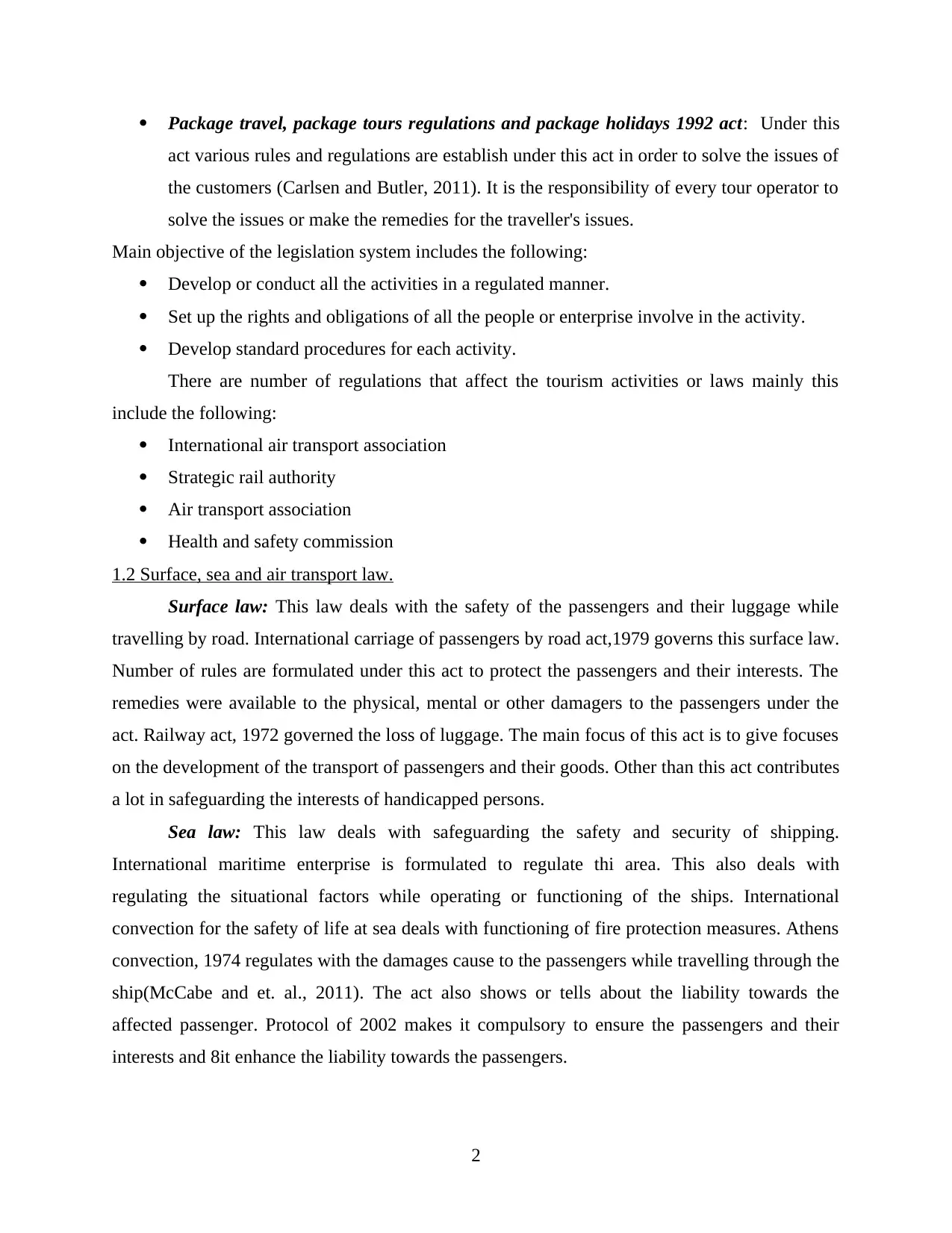
Package travel, package tours regulations and package holidays 1992 act: Under this
act various rules and regulations are establish under this act in order to solve the issues of
the customers (Carlsen and Butler, 2011). It is the responsibility of every tour operator to
solve the issues or make the remedies for the traveller's issues.
Main objective of the legislation system includes the following:
Develop or conduct all the activities in a regulated manner.
Set up the rights and obligations of all the people or enterprise involve in the activity.
Develop standard procedures for each activity.
There are number of regulations that affect the tourism activities or laws mainly this
include the following:
International air transport association
Strategic rail authority
Air transport association
Health and safety commission
1.2 Surface, sea and air transport law.
Surface law: This law deals with the safety of the passengers and their luggage while
travelling by road. International carriage of passengers by road act,1979 governs this surface law.
Number of rules are formulated under this act to protect the passengers and their interests. The
remedies were available to the physical, mental or other damagers to the passengers under the
act. Railway act, 1972 governed the loss of luggage. The main focus of this act is to give focuses
on the development of the transport of passengers and their goods. Other than this act contributes
a lot in safeguarding the interests of handicapped persons.
Sea law: This law deals with safeguarding the safety and security of shipping.
International maritime enterprise is formulated to regulate thi area. This also deals with
regulating the situational factors while operating or functioning of the ships. International
convection for the safety of life at sea deals with functioning of fire protection measures. Athens
convection, 1974 regulates with the damages cause to the passengers while travelling through the
ship(McCabe and et. al., 2011). The act also shows or tells about the liability towards the
affected passenger. Protocol of 2002 makes it compulsory to ensure the passengers and their
interests and 8it enhance the liability towards the passengers.
2
act various rules and regulations are establish under this act in order to solve the issues of
the customers (Carlsen and Butler, 2011). It is the responsibility of every tour operator to
solve the issues or make the remedies for the traveller's issues.
Main objective of the legislation system includes the following:
Develop or conduct all the activities in a regulated manner.
Set up the rights and obligations of all the people or enterprise involve in the activity.
Develop standard procedures for each activity.
There are number of regulations that affect the tourism activities or laws mainly this
include the following:
International air transport association
Strategic rail authority
Air transport association
Health and safety commission
1.2 Surface, sea and air transport law.
Surface law: This law deals with the safety of the passengers and their luggage while
travelling by road. International carriage of passengers by road act,1979 governs this surface law.
Number of rules are formulated under this act to protect the passengers and their interests. The
remedies were available to the physical, mental or other damagers to the passengers under the
act. Railway act, 1972 governed the loss of luggage. The main focus of this act is to give focuses
on the development of the transport of passengers and their goods. Other than this act contributes
a lot in safeguarding the interests of handicapped persons.
Sea law: This law deals with safeguarding the safety and security of shipping.
International maritime enterprise is formulated to regulate thi area. This also deals with
regulating the situational factors while operating or functioning of the ships. International
convection for the safety of life at sea deals with functioning of fire protection measures. Athens
convection, 1974 regulates with the damages cause to the passengers while travelling through the
ship(McCabe and et. al., 2011). The act also shows or tells about the liability towards the
affected passenger. Protocol of 2002 makes it compulsory to ensure the passengers and their
interests and 8it enhance the liability towards the passengers.
2
Paraphrase This Document
Need a fresh take? Get an instant paraphrase of this document with our AI Paraphraser
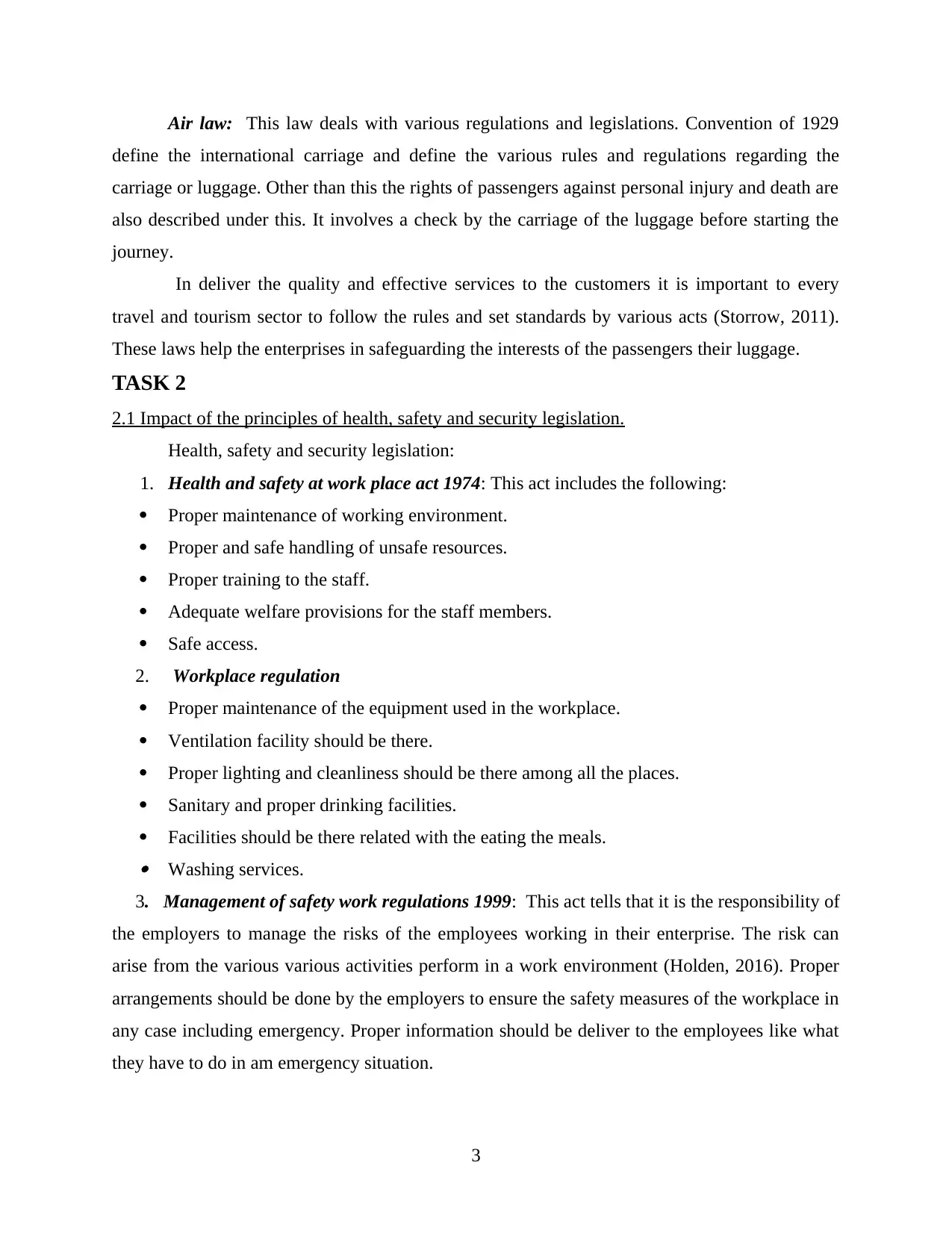
Air law: This law deals with various regulations and legislations. Convention of 1929
define the international carriage and define the various rules and regulations regarding the
carriage or luggage. Other than this the rights of passengers against personal injury and death are
also described under this. It involves a check by the carriage of the luggage before starting the
journey.
In deliver the quality and effective services to the customers it is important to every
travel and tourism sector to follow the rules and set standards by various acts (Storrow, 2011).
These laws help the enterprises in safeguarding the interests of the passengers their luggage.
TASK 2
2.1 Impact of the principles of health, safety and security legislation.
Health, safety and security legislation:
1. Health and safety at work place act 1974: This act includes the following:
Proper maintenance of working environment.
Proper and safe handling of unsafe resources.
Proper training to the staff.
Adequate welfare provisions for the staff members.
Safe access.
2. Workplace regulation
Proper maintenance of the equipment used in the workplace.
Ventilation facility should be there.
Proper lighting and cleanliness should be there among all the places.
Sanitary and proper drinking facilities.
Facilities should be there related with the eating the meals. Washing services.
3. Management of safety work regulations 1999: This act tells that it is the responsibility of
the employers to manage the risks of the employees working in their enterprise. The risk can
arise from the various various activities perform in a work environment (Holden, 2016). Proper
arrangements should be done by the employers to ensure the safety measures of the workplace in
any case including emergency. Proper information should be deliver to the employees like what
they have to do in am emergency situation.
3
define the international carriage and define the various rules and regulations regarding the
carriage or luggage. Other than this the rights of passengers against personal injury and death are
also described under this. It involves a check by the carriage of the luggage before starting the
journey.
In deliver the quality and effective services to the customers it is important to every
travel and tourism sector to follow the rules and set standards by various acts (Storrow, 2011).
These laws help the enterprises in safeguarding the interests of the passengers their luggage.
TASK 2
2.1 Impact of the principles of health, safety and security legislation.
Health, safety and security legislation:
1. Health and safety at work place act 1974: This act includes the following:
Proper maintenance of working environment.
Proper and safe handling of unsafe resources.
Proper training to the staff.
Adequate welfare provisions for the staff members.
Safe access.
2. Workplace regulation
Proper maintenance of the equipment used in the workplace.
Ventilation facility should be there.
Proper lighting and cleanliness should be there among all the places.
Sanitary and proper drinking facilities.
Facilities should be there related with the eating the meals. Washing services.
3. Management of safety work regulations 1999: This act tells that it is the responsibility of
the employers to manage the risks of the employees working in their enterprise. The risk can
arise from the various various activities perform in a work environment (Holden, 2016). Proper
arrangements should be done by the employers to ensure the safety measures of the workplace in
any case including emergency. Proper information should be deliver to the employees like what
they have to do in am emergency situation.
3
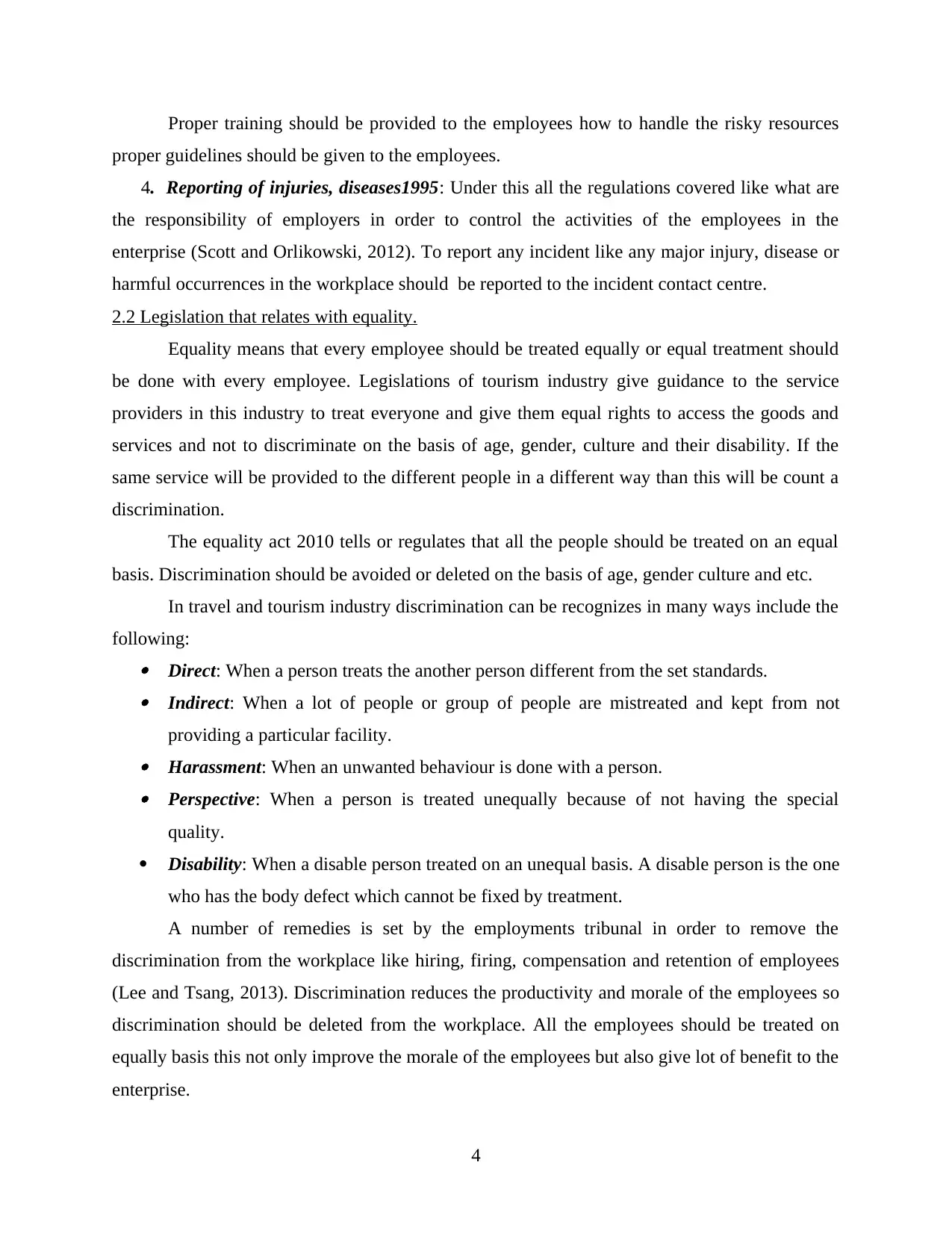
Proper training should be provided to the employees how to handle the risky resources
proper guidelines should be given to the employees.
4. Reporting of injuries, diseases1995: Under this all the regulations covered like what are
the responsibility of employers in order to control the activities of the employees in the
enterprise (Scott and Orlikowski, 2012). To report any incident like any major injury, disease or
harmful occurrences in the workplace should be reported to the incident contact centre.
2.2 Legislation that relates with equality.
Equality means that every employee should be treated equally or equal treatment should
be done with every employee. Legislations of tourism industry give guidance to the service
providers in this industry to treat everyone and give them equal rights to access the goods and
services and not to discriminate on the basis of age, gender, culture and their disability. If the
same service will be provided to the different people in a different way than this will be count a
discrimination.
The equality act 2010 tells or regulates that all the people should be treated on an equal
basis. Discrimination should be avoided or deleted on the basis of age, gender culture and etc.
In travel and tourism industry discrimination can be recognizes in many ways include the
following: Direct: When a person treats the another person different from the set standards. Indirect: When a lot of people or group of people are mistreated and kept from not
providing a particular facility. Harassment: When an unwanted behaviour is done with a person. Perspective: When a person is treated unequally because of not having the special
quality.
Disability: When a disable person treated on an unequal basis. A disable person is the one
who has the body defect which cannot be fixed by treatment.
A number of remedies is set by the employments tribunal in order to remove the
discrimination from the workplace like hiring, firing, compensation and retention of employees
(Lee and Tsang, 2013). Discrimination reduces the productivity and morale of the employees so
discrimination should be deleted from the workplace. All the employees should be treated on
equally basis this not only improve the morale of the employees but also give lot of benefit to the
enterprise.
4
proper guidelines should be given to the employees.
4. Reporting of injuries, diseases1995: Under this all the regulations covered like what are
the responsibility of employers in order to control the activities of the employees in the
enterprise (Scott and Orlikowski, 2012). To report any incident like any major injury, disease or
harmful occurrences in the workplace should be reported to the incident contact centre.
2.2 Legislation that relates with equality.
Equality means that every employee should be treated equally or equal treatment should
be done with every employee. Legislations of tourism industry give guidance to the service
providers in this industry to treat everyone and give them equal rights to access the goods and
services and not to discriminate on the basis of age, gender, culture and their disability. If the
same service will be provided to the different people in a different way than this will be count a
discrimination.
The equality act 2010 tells or regulates that all the people should be treated on an equal
basis. Discrimination should be avoided or deleted on the basis of age, gender culture and etc.
In travel and tourism industry discrimination can be recognizes in many ways include the
following: Direct: When a person treats the another person different from the set standards. Indirect: When a lot of people or group of people are mistreated and kept from not
providing a particular facility. Harassment: When an unwanted behaviour is done with a person. Perspective: When a person is treated unequally because of not having the special
quality.
Disability: When a disable person treated on an unequal basis. A disable person is the one
who has the body defect which cannot be fixed by treatment.
A number of remedies is set by the employments tribunal in order to remove the
discrimination from the workplace like hiring, firing, compensation and retention of employees
(Lee and Tsang, 2013). Discrimination reduces the productivity and morale of the employees so
discrimination should be deleted from the workplace. All the employees should be treated on
equally basis this not only improve the morale of the employees but also give lot of benefit to the
enterprise.
4
⊘ This is a preview!⊘
Do you want full access?
Subscribe today to unlock all pages.

Trusted by 1+ million students worldwide
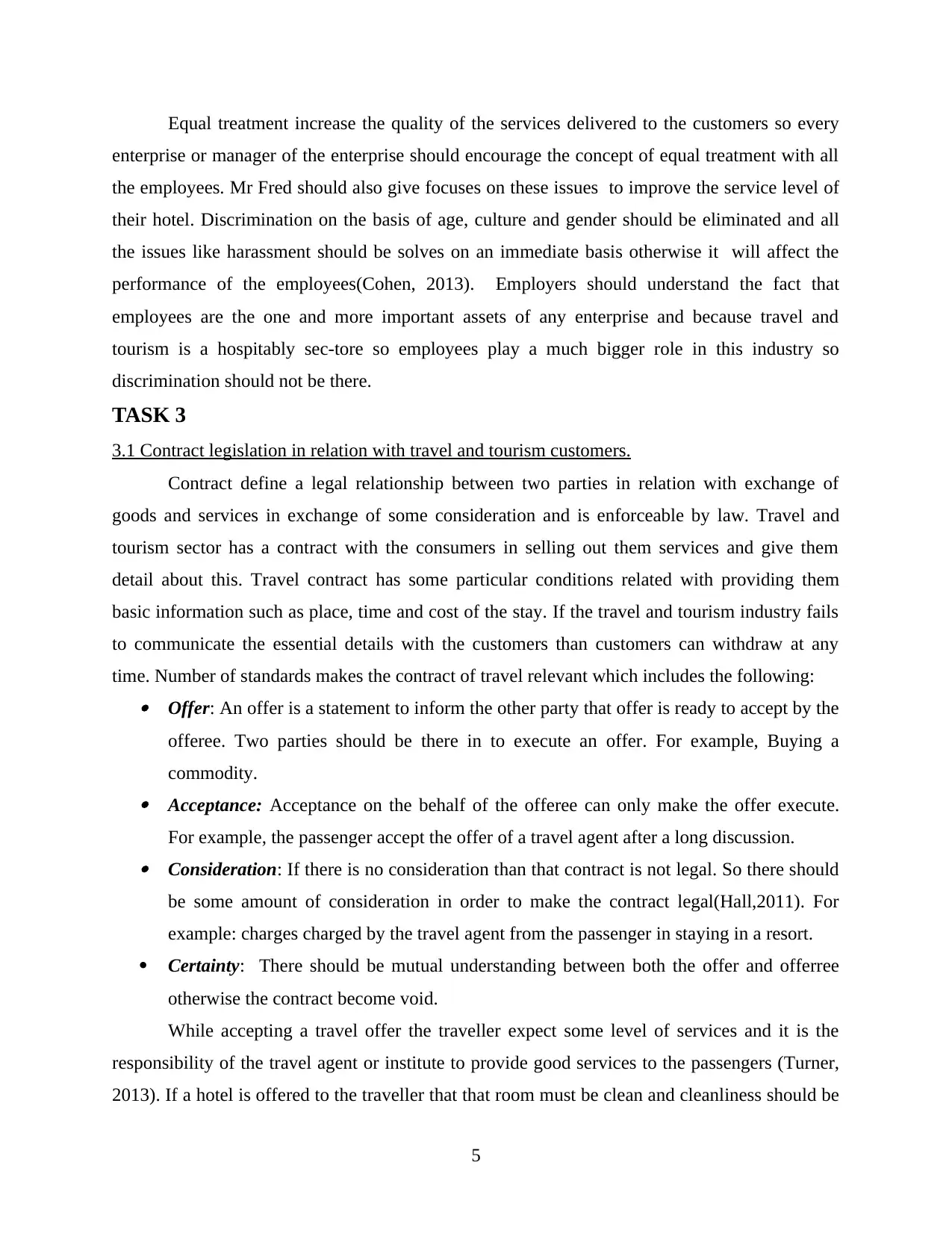
Equal treatment increase the quality of the services delivered to the customers so every
enterprise or manager of the enterprise should encourage the concept of equal treatment with all
the employees. Mr Fred should also give focuses on these issues to improve the service level of
their hotel. Discrimination on the basis of age, culture and gender should be eliminated and all
the issues like harassment should be solves on an immediate basis otherwise it will affect the
performance of the employees(Cohen, 2013). Employers should understand the fact that
employees are the one and more important assets of any enterprise and because travel and
tourism is a hospitably sec-tore so employees play a much bigger role in this industry so
discrimination should not be there.
TASK 3
3.1 Contract legislation in relation with travel and tourism customers.
Contract define a legal relationship between two parties in relation with exchange of
goods and services in exchange of some consideration and is enforceable by law. Travel and
tourism sector has a contract with the consumers in selling out them services and give them
detail about this. Travel contract has some particular conditions related with providing them
basic information such as place, time and cost of the stay. If the travel and tourism industry fails
to communicate the essential details with the customers than customers can withdraw at any
time. Number of standards makes the contract of travel relevant which includes the following: Offer: An offer is a statement to inform the other party that offer is ready to accept by the
offeree. Two parties should be there in to execute an offer. For example, Buying a
commodity. Acceptance: Acceptance on the behalf of the offeree can only make the offer execute.
For example, the passenger accept the offer of a travel agent after a long discussion. Consideration: If there is no consideration than that contract is not legal. So there should
be some amount of consideration in order to make the contract legal(Hall,2011). For
example: charges charged by the travel agent from the passenger in staying in a resort.
Certainty: There should be mutual understanding between both the offer and offerree
otherwise the contract become void.
While accepting a travel offer the traveller expect some level of services and it is the
responsibility of the travel agent or institute to provide good services to the passengers (Turner,
2013). If a hotel is offered to the traveller that that room must be clean and cleanliness should be
5
enterprise or manager of the enterprise should encourage the concept of equal treatment with all
the employees. Mr Fred should also give focuses on these issues to improve the service level of
their hotel. Discrimination on the basis of age, culture and gender should be eliminated and all
the issues like harassment should be solves on an immediate basis otherwise it will affect the
performance of the employees(Cohen, 2013). Employers should understand the fact that
employees are the one and more important assets of any enterprise and because travel and
tourism is a hospitably sec-tore so employees play a much bigger role in this industry so
discrimination should not be there.
TASK 3
3.1 Contract legislation in relation with travel and tourism customers.
Contract define a legal relationship between two parties in relation with exchange of
goods and services in exchange of some consideration and is enforceable by law. Travel and
tourism sector has a contract with the consumers in selling out them services and give them
detail about this. Travel contract has some particular conditions related with providing them
basic information such as place, time and cost of the stay. If the travel and tourism industry fails
to communicate the essential details with the customers than customers can withdraw at any
time. Number of standards makes the contract of travel relevant which includes the following: Offer: An offer is a statement to inform the other party that offer is ready to accept by the
offeree. Two parties should be there in to execute an offer. For example, Buying a
commodity. Acceptance: Acceptance on the behalf of the offeree can only make the offer execute.
For example, the passenger accept the offer of a travel agent after a long discussion. Consideration: If there is no consideration than that contract is not legal. So there should
be some amount of consideration in order to make the contract legal(Hall,2011). For
example: charges charged by the travel agent from the passenger in staying in a resort.
Certainty: There should be mutual understanding between both the offer and offerree
otherwise the contract become void.
While accepting a travel offer the traveller expect some level of services and it is the
responsibility of the travel agent or institute to provide good services to the passengers (Turner,
2013). If a hotel is offered to the traveller that that room must be clean and cleanliness should be
5
Paraphrase This Document
Need a fresh take? Get an instant paraphrase of this document with our AI Paraphraser
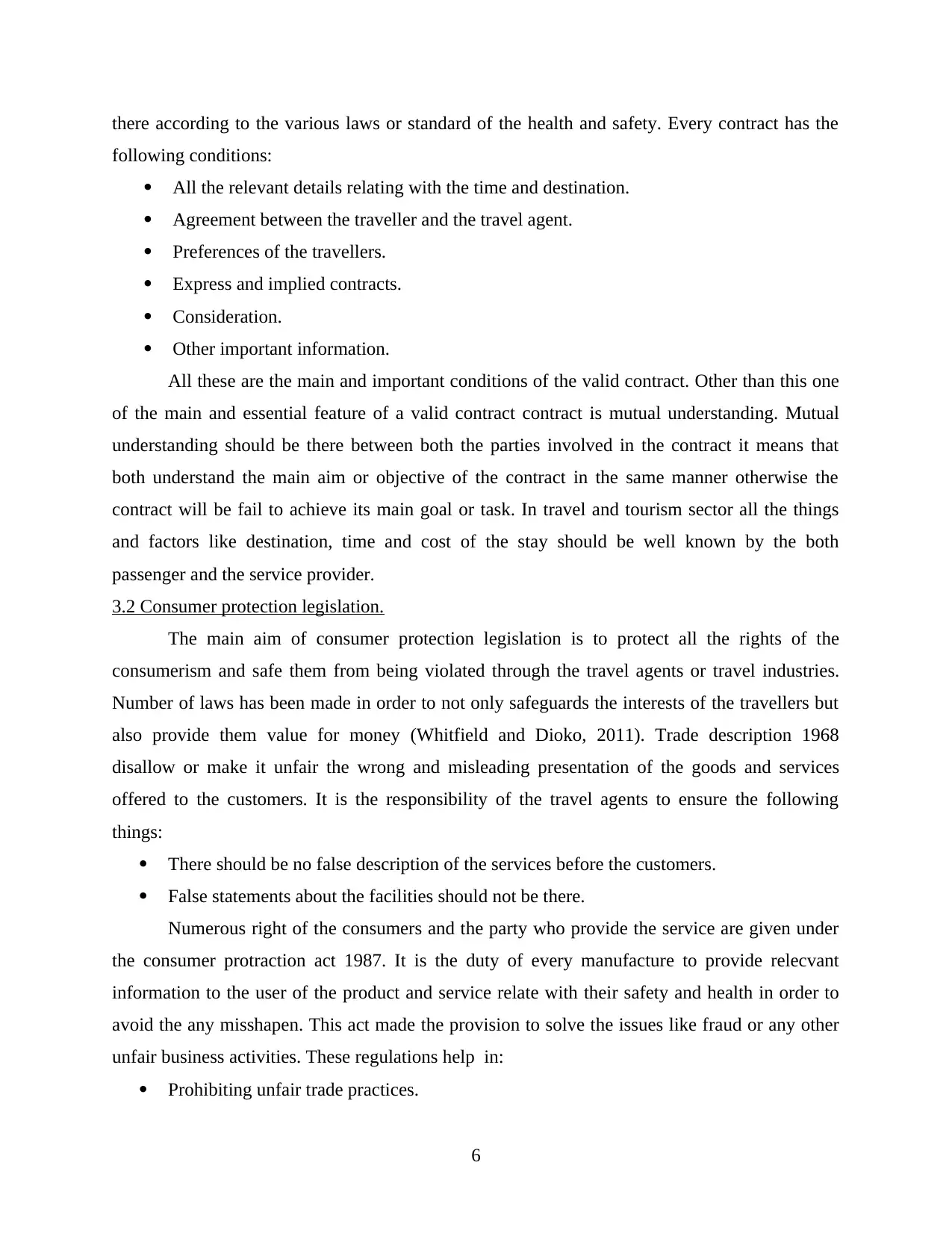
there according to the various laws or standard of the health and safety. Every contract has the
following conditions:
All the relevant details relating with the time and destination.
Agreement between the traveller and the travel agent.
Preferences of the travellers.
Express and implied contracts.
Consideration.
Other important information.
All these are the main and important conditions of the valid contract. Other than this one
of the main and essential feature of a valid contract contract is mutual understanding. Mutual
understanding should be there between both the parties involved in the contract it means that
both understand the main aim or objective of the contract in the same manner otherwise the
contract will be fail to achieve its main goal or task. In travel and tourism sector all the things
and factors like destination, time and cost of the stay should be well known by the both
passenger and the service provider.
3.2 Consumer protection legislation.
The main aim of consumer protection legislation is to protect all the rights of the
consumerism and safe them from being violated through the travel agents or travel industries.
Number of laws has been made in order to not only safeguards the interests of the travellers but
also provide them value for money (Whitfield and Dioko, 2011). Trade description 1968
disallow or make it unfair the wrong and misleading presentation of the goods and services
offered to the customers. It is the responsibility of the travel agents to ensure the following
things:
There should be no false description of the services before the customers.
False statements about the facilities should not be there.
Numerous right of the consumers and the party who provide the service are given under
the consumer protraction act 1987. It is the duty of every manufacture to provide relecvant
information to the user of the product and service relate with their safety and health in order to
avoid the any misshapen. This act made the provision to solve the issues like fraud or any other
unfair business activities. These regulations help in:
Prohibiting unfair trade practices.
6
following conditions:
All the relevant details relating with the time and destination.
Agreement between the traveller and the travel agent.
Preferences of the travellers.
Express and implied contracts.
Consideration.
Other important information.
All these are the main and important conditions of the valid contract. Other than this one
of the main and essential feature of a valid contract contract is mutual understanding. Mutual
understanding should be there between both the parties involved in the contract it means that
both understand the main aim or objective of the contract in the same manner otherwise the
contract will be fail to achieve its main goal or task. In travel and tourism sector all the things
and factors like destination, time and cost of the stay should be well known by the both
passenger and the service provider.
3.2 Consumer protection legislation.
The main aim of consumer protection legislation is to protect all the rights of the
consumerism and safe them from being violated through the travel agents or travel industries.
Number of laws has been made in order to not only safeguards the interests of the travellers but
also provide them value for money (Whitfield and Dioko, 2011). Trade description 1968
disallow or make it unfair the wrong and misleading presentation of the goods and services
offered to the customers. It is the responsibility of the travel agents to ensure the following
things:
There should be no false description of the services before the customers.
False statements about the facilities should not be there.
Numerous right of the consumers and the party who provide the service are given under
the consumer protraction act 1987. It is the duty of every manufacture to provide relecvant
information to the user of the product and service relate with their safety and health in order to
avoid the any misshapen. This act made the provision to solve the issues like fraud or any other
unfair business activities. These regulations help in:
Prohibiting unfair trade practices.
6
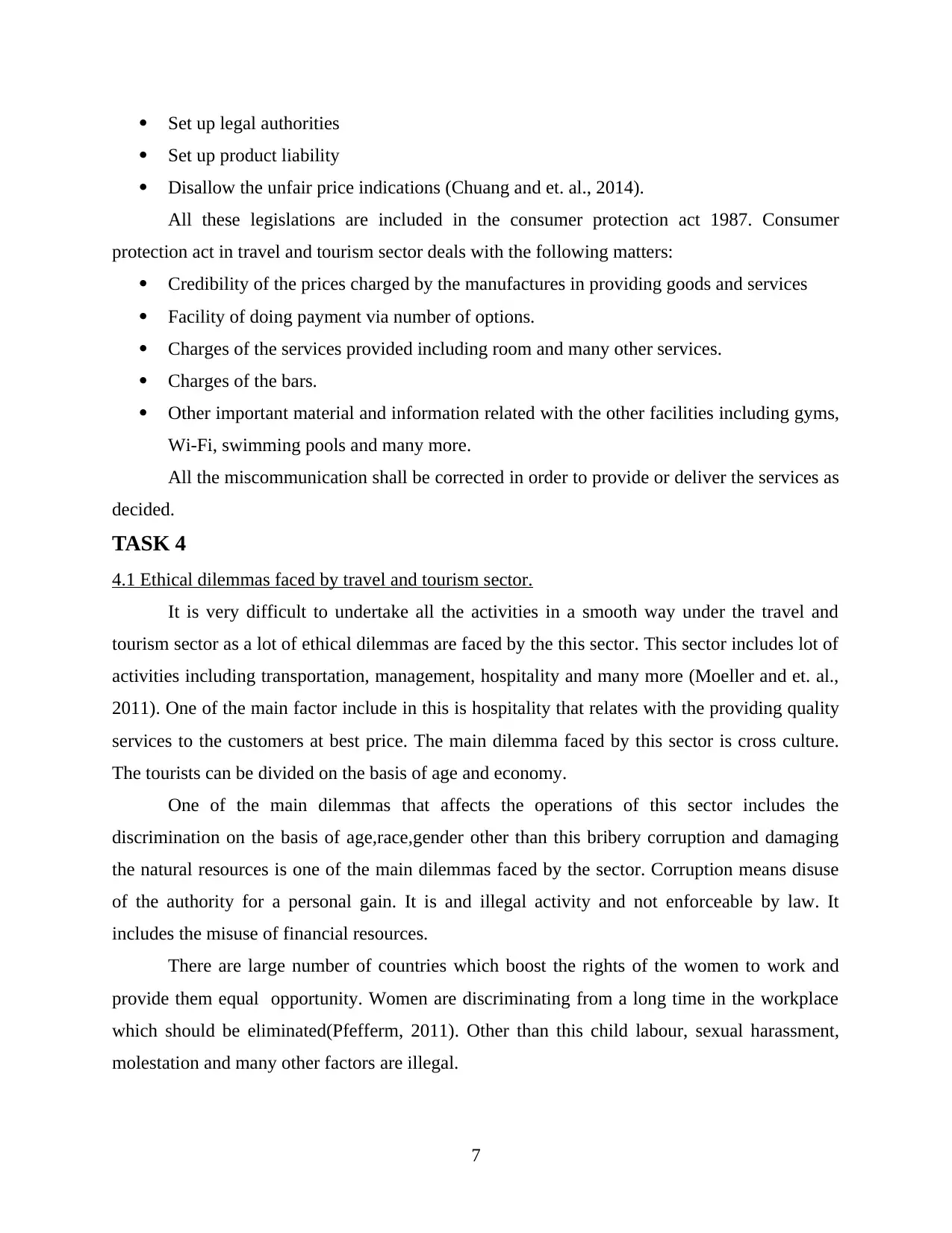
Set up legal authorities
Set up product liability
Disallow the unfair price indications (Chuang and et. al., 2014).
All these legislations are included in the consumer protection act 1987. Consumer
protection act in travel and tourism sector deals with the following matters:
Credibility of the prices charged by the manufactures in providing goods and services
Facility of doing payment via number of options.
Charges of the services provided including room and many other services.
Charges of the bars.
Other important material and information related with the other facilities including gyms,
Wi-Fi, swimming pools and many more.
All the miscommunication shall be corrected in order to provide or deliver the services as
decided.
TASK 4
4.1 Ethical dilemmas faced by travel and tourism sector.
It is very difficult to undertake all the activities in a smooth way under the travel and
tourism sector as a lot of ethical dilemmas are faced by the this sector. This sector includes lot of
activities including transportation, management, hospitality and many more (Moeller and et. al.,
2011). One of the main factor include in this is hospitality that relates with the providing quality
services to the customers at best price. The main dilemma faced by this sector is cross culture.
The tourists can be divided on the basis of age and economy.
One of the main dilemmas that affects the operations of this sector includes the
discrimination on the basis of age,race,gender other than this bribery corruption and damaging
the natural resources is one of the main dilemmas faced by the sector. Corruption means disuse
of the authority for a personal gain. It is and illegal activity and not enforceable by law. It
includes the misuse of financial resources.
There are large number of countries which boost the rights of the women to work and
provide them equal opportunity. Women are discriminating from a long time in the workplace
which should be eliminated(Pfefferm, 2011). Other than this child labour, sexual harassment,
molestation and many other factors are illegal.
7
Set up product liability
Disallow the unfair price indications (Chuang and et. al., 2014).
All these legislations are included in the consumer protection act 1987. Consumer
protection act in travel and tourism sector deals with the following matters:
Credibility of the prices charged by the manufactures in providing goods and services
Facility of doing payment via number of options.
Charges of the services provided including room and many other services.
Charges of the bars.
Other important material and information related with the other facilities including gyms,
Wi-Fi, swimming pools and many more.
All the miscommunication shall be corrected in order to provide or deliver the services as
decided.
TASK 4
4.1 Ethical dilemmas faced by travel and tourism sector.
It is very difficult to undertake all the activities in a smooth way under the travel and
tourism sector as a lot of ethical dilemmas are faced by the this sector. This sector includes lot of
activities including transportation, management, hospitality and many more (Moeller and et. al.,
2011). One of the main factor include in this is hospitality that relates with the providing quality
services to the customers at best price. The main dilemma faced by this sector is cross culture.
The tourists can be divided on the basis of age and economy.
One of the main dilemmas that affects the operations of this sector includes the
discrimination on the basis of age,race,gender other than this bribery corruption and damaging
the natural resources is one of the main dilemmas faced by the sector. Corruption means disuse
of the authority for a personal gain. It is and illegal activity and not enforceable by law. It
includes the misuse of financial resources.
There are large number of countries which boost the rights of the women to work and
provide them equal opportunity. Women are discriminating from a long time in the workplace
which should be eliminated(Pfefferm, 2011). Other than this child labour, sexual harassment,
molestation and many other factors are illegal.
7
⊘ This is a preview!⊘
Do you want full access?
Subscribe today to unlock all pages.

Trusted by 1+ million students worldwide
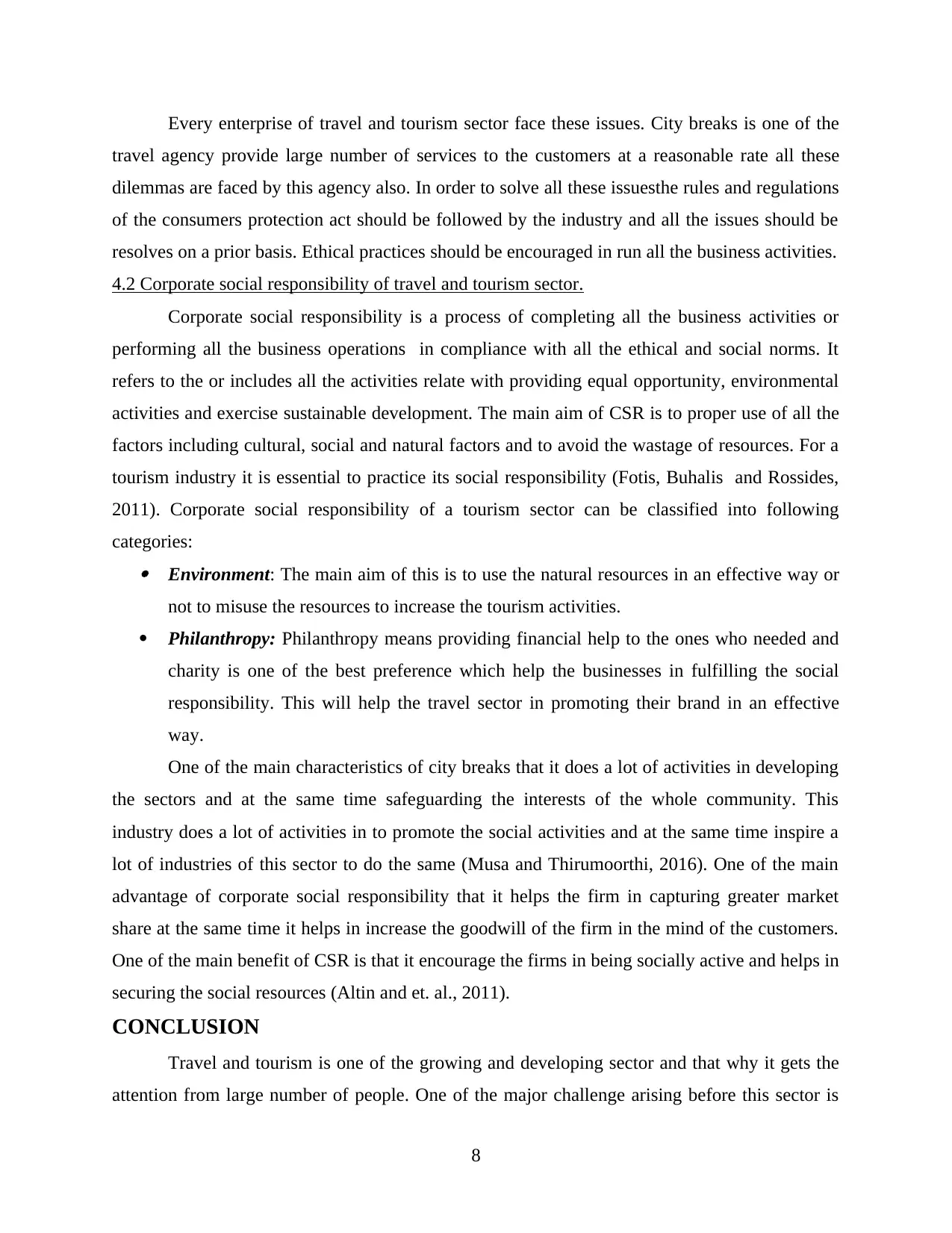
Every enterprise of travel and tourism sector face these issues. City breaks is one of the
travel agency provide large number of services to the customers at a reasonable rate all these
dilemmas are faced by this agency also. In order to solve all these issuesthe rules and regulations
of the consumers protection act should be followed by the industry and all the issues should be
resolves on a prior basis. Ethical practices should be encouraged in run all the business activities.
4.2 Corporate social responsibility of travel and tourism sector.
Corporate social responsibility is a process of completing all the business activities or
performing all the business operations in compliance with all the ethical and social norms. It
refers to the or includes all the activities relate with providing equal opportunity, environmental
activities and exercise sustainable development. The main aim of CSR is to proper use of all the
factors including cultural, social and natural factors and to avoid the wastage of resources. For a
tourism industry it is essential to practice its social responsibility (Fotis, Buhalis and Rossides,
2011). Corporate social responsibility of a tourism sector can be classified into following
categories: Environment: The main aim of this is to use the natural resources in an effective way or
not to misuse the resources to increase the tourism activities.
Philanthropy: Philanthropy means providing financial help to the ones who needed and
charity is one of the best preference which help the businesses in fulfilling the social
responsibility. This will help the travel sector in promoting their brand in an effective
way.
One of the main characteristics of city breaks that it does a lot of activities in developing
the sectors and at the same time safeguarding the interests of the whole community. This
industry does a lot of activities in to promote the social activities and at the same time inspire a
lot of industries of this sector to do the same (Musa and Thirumoorthi, 2016). One of the main
advantage of corporate social responsibility that it helps the firm in capturing greater market
share at the same time it helps in increase the goodwill of the firm in the mind of the customers.
One of the main benefit of CSR is that it encourage the firms in being socially active and helps in
securing the social resources (Altin and et. al., 2011).
CONCLUSION
Travel and tourism is one of the growing and developing sector and that why it gets the
attention from large number of people. One of the major challenge arising before this sector is
8
travel agency provide large number of services to the customers at a reasonable rate all these
dilemmas are faced by this agency also. In order to solve all these issuesthe rules and regulations
of the consumers protection act should be followed by the industry and all the issues should be
resolves on a prior basis. Ethical practices should be encouraged in run all the business activities.
4.2 Corporate social responsibility of travel and tourism sector.
Corporate social responsibility is a process of completing all the business activities or
performing all the business operations in compliance with all the ethical and social norms. It
refers to the or includes all the activities relate with providing equal opportunity, environmental
activities and exercise sustainable development. The main aim of CSR is to proper use of all the
factors including cultural, social and natural factors and to avoid the wastage of resources. For a
tourism industry it is essential to practice its social responsibility (Fotis, Buhalis and Rossides,
2011). Corporate social responsibility of a tourism sector can be classified into following
categories: Environment: The main aim of this is to use the natural resources in an effective way or
not to misuse the resources to increase the tourism activities.
Philanthropy: Philanthropy means providing financial help to the ones who needed and
charity is one of the best preference which help the businesses in fulfilling the social
responsibility. This will help the travel sector in promoting their brand in an effective
way.
One of the main characteristics of city breaks that it does a lot of activities in developing
the sectors and at the same time safeguarding the interests of the whole community. This
industry does a lot of activities in to promote the social activities and at the same time inspire a
lot of industries of this sector to do the same (Musa and Thirumoorthi, 2016). One of the main
advantage of corporate social responsibility that it helps the firm in capturing greater market
share at the same time it helps in increase the goodwill of the firm in the mind of the customers.
One of the main benefit of CSR is that it encourage the firms in being socially active and helps in
securing the social resources (Altin and et. al., 2011).
CONCLUSION
Travel and tourism is one of the growing and developing sector and that why it gets the
attention from large number of people. One of the major challenge arising before this sector is
8
Paraphrase This Document
Need a fresh take? Get an instant paraphrase of this document with our AI Paraphraser
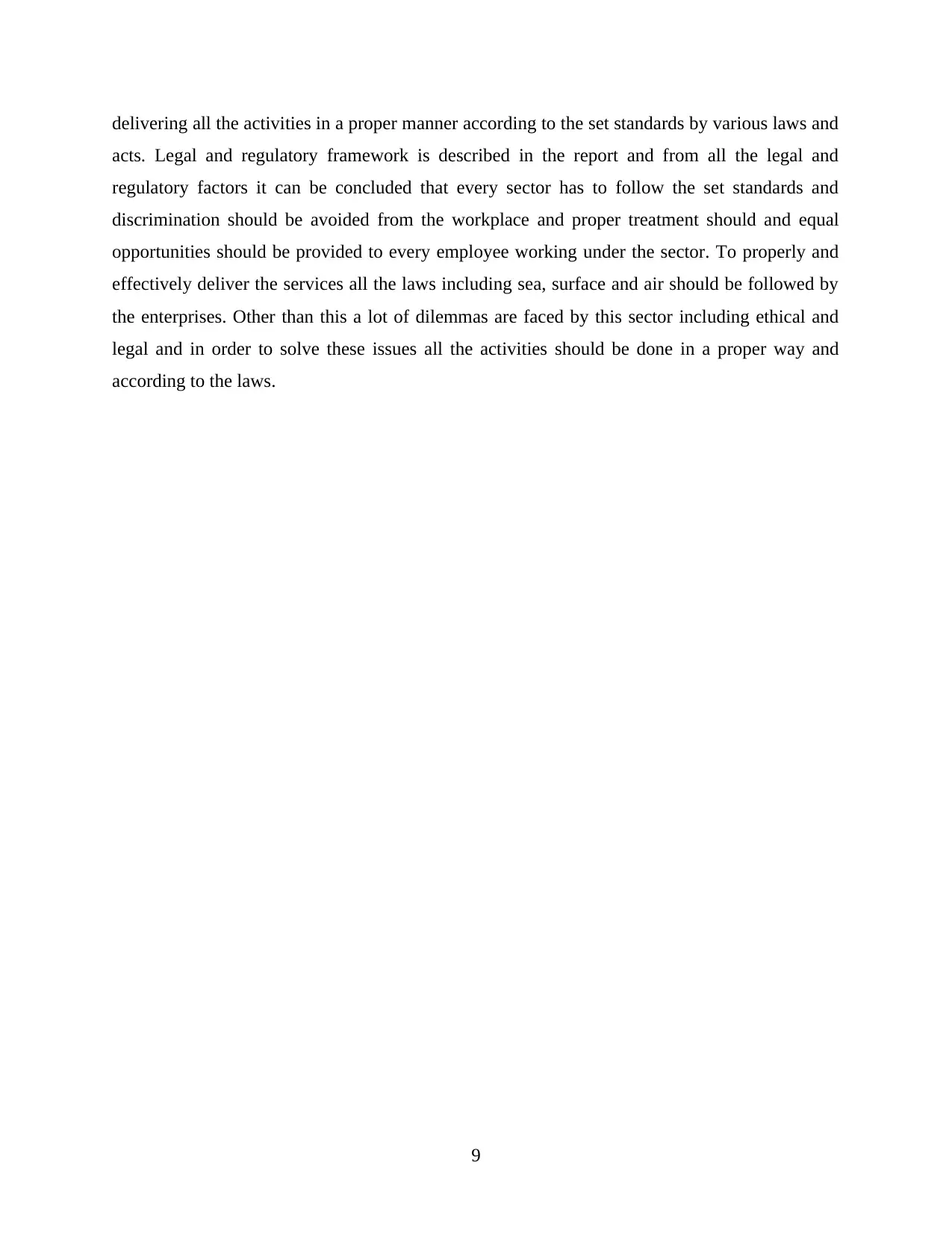
delivering all the activities in a proper manner according to the set standards by various laws and
acts. Legal and regulatory framework is described in the report and from all the legal and
regulatory factors it can be concluded that every sector has to follow the set standards and
discrimination should be avoided from the workplace and proper treatment should and equal
opportunities should be provided to every employee working under the sector. To properly and
effectively deliver the services all the laws including sea, surface and air should be followed by
the enterprises. Other than this a lot of dilemmas are faced by this sector including ethical and
legal and in order to solve these issues all the activities should be done in a proper way and
according to the laws.
9
acts. Legal and regulatory framework is described in the report and from all the legal and
regulatory factors it can be concluded that every sector has to follow the set standards and
discrimination should be avoided from the workplace and proper treatment should and equal
opportunities should be provided to every employee working under the sector. To properly and
effectively deliver the services all the laws including sea, surface and air should be followed by
the enterprises. Other than this a lot of dilemmas are faced by this sector including ethical and
legal and in order to solve these issues all the activities should be done in a proper way and
according to the laws.
9
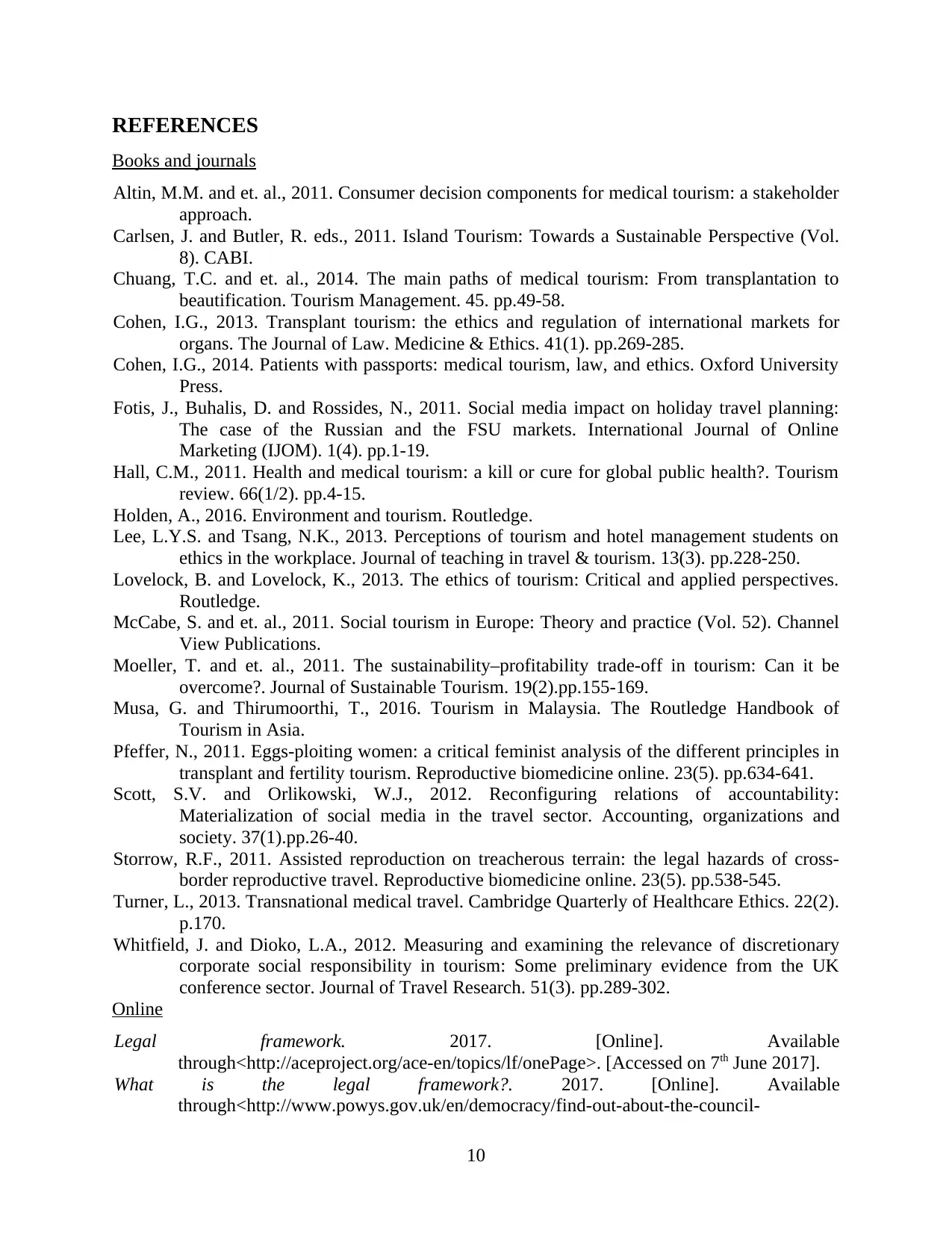
REFERENCES
Books and journals
Altin, M.M. and et. al., 2011. Consumer decision components for medical tourism: a stakeholder
approach.
Carlsen, J. and Butler, R. eds., 2011. Island Tourism: Towards a Sustainable Perspective (Vol.
8). CABI.
Chuang, T.C. and et. al., 2014. The main paths of medical tourism: From transplantation to
beautification. Tourism Management. 45. pp.49-58.
Cohen, I.G., 2013. Transplant tourism: the ethics and regulation of international markets for
organs. The Journal of Law. Medicine & Ethics. 41(1). pp.269-285.
Cohen, I.G., 2014. Patients with passports: medical tourism, law, and ethics. Oxford University
Press.
Fotis, J., Buhalis, D. and Rossides, N., 2011. Social media impact on holiday travel planning:
The case of the Russian and the FSU markets. International Journal of Online
Marketing (IJOM). 1(4). pp.1-19.
Hall, C.M., 2011. Health and medical tourism: a kill or cure for global public health?. Tourism
review. 66(1/2). pp.4-15.
Holden, A., 2016. Environment and tourism. Routledge.
Lee, L.Y.S. and Tsang, N.K., 2013. Perceptions of tourism and hotel management students on
ethics in the workplace. Journal of teaching in travel & tourism. 13(3). pp.228-250.
Lovelock, B. and Lovelock, K., 2013. The ethics of tourism: Critical and applied perspectives.
Routledge.
McCabe, S. and et. al., 2011. Social tourism in Europe: Theory and practice (Vol. 52). Channel
View Publications.
Moeller, T. and et. al., 2011. The sustainability–profitability trade-off in tourism: Can it be
overcome?. Journal of Sustainable Tourism. 19(2).pp.155-169.
Musa, G. and Thirumoorthi, T., 2016. Tourism in Malaysia. The Routledge Handbook of
Tourism in Asia.
Pfeffer, N., 2011. Eggs-ploiting women: a critical feminist analysis of the different principles in
transplant and fertility tourism. Reproductive biomedicine online. 23(5). pp.634-641.
Scott, S.V. and Orlikowski, W.J., 2012. Reconfiguring relations of accountability:
Materialization of social media in the travel sector. Accounting, organizations and
society. 37(1).pp.26-40.
Storrow, R.F., 2011. Assisted reproduction on treacherous terrain: the legal hazards of cross-
border reproductive travel. Reproductive biomedicine online. 23(5). pp.538-545.
Turner, L., 2013. Transnational medical travel. Cambridge Quarterly of Healthcare Ethics. 22(2).
p.170.
Whitfield, J. and Dioko, L.A., 2012. Measuring and examining the relevance of discretionary
corporate social responsibility in tourism: Some preliminary evidence from the UK
conference sector. Journal of Travel Research. 51(3). pp.289-302.
Online
Legal framework. 2017. [Online]. Available
through<http://aceproject.org/ace-en/topics/lf/onePage>. [Accessed on 7th June 2017].
What is the legal framework?. 2017. [Online]. Available
through<http://www.powys.gov.uk/en/democracy/find-out-about-the-council-
10
Books and journals
Altin, M.M. and et. al., 2011. Consumer decision components for medical tourism: a stakeholder
approach.
Carlsen, J. and Butler, R. eds., 2011. Island Tourism: Towards a Sustainable Perspective (Vol.
8). CABI.
Chuang, T.C. and et. al., 2014. The main paths of medical tourism: From transplantation to
beautification. Tourism Management. 45. pp.49-58.
Cohen, I.G., 2013. Transplant tourism: the ethics and regulation of international markets for
organs. The Journal of Law. Medicine & Ethics. 41(1). pp.269-285.
Cohen, I.G., 2014. Patients with passports: medical tourism, law, and ethics. Oxford University
Press.
Fotis, J., Buhalis, D. and Rossides, N., 2011. Social media impact on holiday travel planning:
The case of the Russian and the FSU markets. International Journal of Online
Marketing (IJOM). 1(4). pp.1-19.
Hall, C.M., 2011. Health and medical tourism: a kill or cure for global public health?. Tourism
review. 66(1/2). pp.4-15.
Holden, A., 2016. Environment and tourism. Routledge.
Lee, L.Y.S. and Tsang, N.K., 2013. Perceptions of tourism and hotel management students on
ethics in the workplace. Journal of teaching in travel & tourism. 13(3). pp.228-250.
Lovelock, B. and Lovelock, K., 2013. The ethics of tourism: Critical and applied perspectives.
Routledge.
McCabe, S. and et. al., 2011. Social tourism in Europe: Theory and practice (Vol. 52). Channel
View Publications.
Moeller, T. and et. al., 2011. The sustainability–profitability trade-off in tourism: Can it be
overcome?. Journal of Sustainable Tourism. 19(2).pp.155-169.
Musa, G. and Thirumoorthi, T., 2016. Tourism in Malaysia. The Routledge Handbook of
Tourism in Asia.
Pfeffer, N., 2011. Eggs-ploiting women: a critical feminist analysis of the different principles in
transplant and fertility tourism. Reproductive biomedicine online. 23(5). pp.634-641.
Scott, S.V. and Orlikowski, W.J., 2012. Reconfiguring relations of accountability:
Materialization of social media in the travel sector. Accounting, organizations and
society. 37(1).pp.26-40.
Storrow, R.F., 2011. Assisted reproduction on treacherous terrain: the legal hazards of cross-
border reproductive travel. Reproductive biomedicine online. 23(5). pp.538-545.
Turner, L., 2013. Transnational medical travel. Cambridge Quarterly of Healthcare Ethics. 22(2).
p.170.
Whitfield, J. and Dioko, L.A., 2012. Measuring and examining the relevance of discretionary
corporate social responsibility in tourism: Some preliminary evidence from the UK
conference sector. Journal of Travel Research. 51(3). pp.289-302.
Online
Legal framework. 2017. [Online]. Available
through<http://aceproject.org/ace-en/topics/lf/onePage>. [Accessed on 7th June 2017].
What is the legal framework?. 2017. [Online]. Available
through<http://www.powys.gov.uk/en/democracy/find-out-about-the-council-
10
⊘ This is a preview!⊘
Do you want full access?
Subscribe today to unlock all pages.

Trusted by 1+ million students worldwide
1 out of 13
Related Documents
Your All-in-One AI-Powered Toolkit for Academic Success.
+13062052269
info@desklib.com
Available 24*7 on WhatsApp / Email
![[object Object]](/_next/static/media/star-bottom.7253800d.svg)
Unlock your academic potential
Copyright © 2020–2026 A2Z Services. All Rights Reserved. Developed and managed by ZUCOL.





